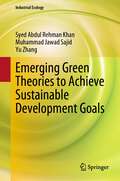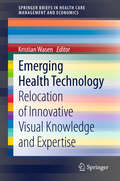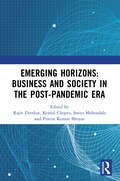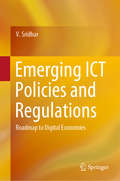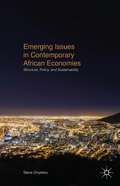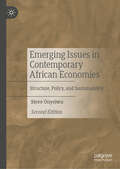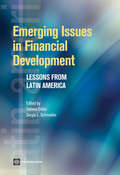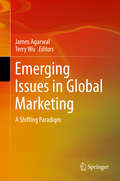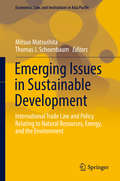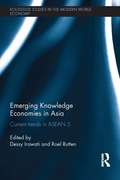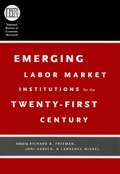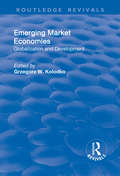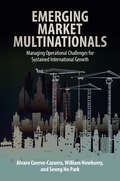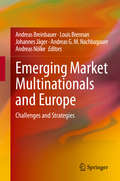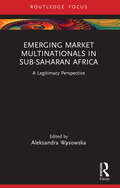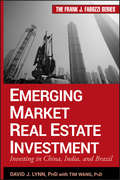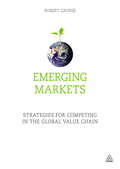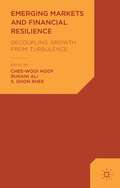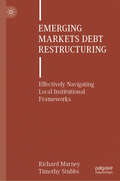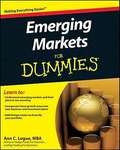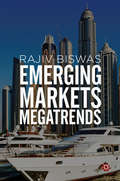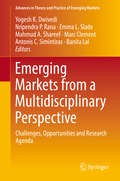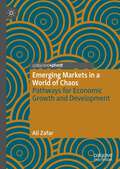- Table View
- List View
Emerging Green Theories to Achieve Sustainable Development Goals (Industrial Ecology)
by Yu Zhang Syed Abdul Khan Muhammad Jawad SajidThis book opens up a critical dimension to the field of industrial ecology. The book discusses the emerging green theories in industrial ecology and evolving practices adopted by businesses to achieve Sustainable Development Goals. The author(s) identifies valuable lessons to be learned and presents conceptual frameworks and ideas to guide future industrial ecology applications, which are integrated into the triple bottom line approach and have cornerstone value to achieving Sustainable Development Goals. Additionally, the book discusses the relevant economic theories that serve as the foundation for the presented green views. This elaboration of economic ideas reinforces our work's relevance to achieving a green economy. Therefore, this book is essential for industrial ecology scholars and those interested in ensuring an environmentally sustainable future.
Emerging Health Technology
by Kristian WasenThis book reports cutting-edge cases of emerging health technologies. Some health care fields are experiencing paradigmatic shifts because of robotic technologies and the new relationships that they create in r-Health (r-Curing and r-Caring) activities. The book explores emerging health care technologies such as image-guided surgical robotics, pharmacy robots, new visualisation methods (3D, 4D & "5D") and home telehealth management systems and their acceptance in the workplace but also, more generally, their special role in business and society. These technologies allow health care professionals to effectively reach far beyond the current service offerings, providing new methods for communication, diagnosis, and treatment. The relocation of certain knowledge areas from physicians to patients in self-care management or the reconfiguration of health care expertise from one health profession to another are examples of topics developed in this book. The book describes the emerging relocation of innovative visual knowledge and expertise within health care organisations and beyond, such as in the patient's home environment.
Emerging Horizons: Proceedings of 13th Annual Research Conference on ‘Pandemic to Endemic: Propositions for the Future’ of Symbiosis Institute of Management Studies
by Rajiv Divekar Komal Chopra Smita Mehendale Pravin Kumar BhoyarThe COVID-19 pandemic dominated our lives since its outbreak in the year 2020. The whole economy was disrupted, and businesses and society had to adapt to the new normal. Since the last two years, the release of different vaccines and the vaccination drive have helped to contain the pandemic to quite an extent. It is believed that irrespective of the different doses of vaccination and its impact on the citizens, the virus is here to stay and will translate into an endemic. An endemic situation is where the COVID-19 virus will be confined to certain people and regions. The COVID-19 pandemic drastically impacted businesses, which had to move from a physical mode to an online mode and hybrid mode. While several steps were taken to contain the pandemic, its lasting effect made organizations and society rethink the future. Organizations have moved from offline to hybrid mode and now work from home. The propositions in sales have changed from price to consumer well-being and convenience. Consumers have become health conscious. Healthcare has become a necessity, and healthcare companies are taking different steps to penetrate the market with immunity boosters. Education is now offered extensively through digital media and has become another alternative. The conference theme, “Pandemic to Endemic: Propositions for the Future,” aims to identify the initiatives businesses and society will adopt for their sustained growth and development. The book provides research insights on how organizations should deal with endemic situations in different business areas. This book includes research in finance, marketing, human resources, healthcare, economics, education, and general management, such as leadership and decision□making.
Emerging ICT Policies and Regulations: Roadmap to Digital Economies
by V. SridharThis book constructs both educational and research arguments on various dimensions of Information and Communication Technology (ICT) policy and regulation. There has been a paradigm shift in the ICT industry due to convergence of various technologies, the ubiquity of the Internet, the emergence of app economy and the pervasiveness of social media. These pose policy and regulatory challenges in the areas of industry structure, market power of firms, pricing of products and services, interconnection of networks, radio spectrum management, intellectual property rights, data privacy and security.The common thread throughout the different sections of the book is the massive adoption of digitization by individuals, enterprises, governments and societies and the critical role of associated regulation and policy for its success.The book addresses 13 important questions in the areas of: i) Telecom Regulation including bundling of products and services, interconnection, and radio spectrum; (ii) Internet Regulation including governance of the Internet, Net Neutrality, quality of service, and cyber security; (iii) App Economy Regulation including Over The Top communication and broadcast services, ICT platform intermediation, sharing economy, data protection and privacy; and (iv) Emerging Technology Regulation including Artificial Intelligence and Intellectual Property Rights. The book explains technology and related regulatory concepts in an easy-to-read format and includes brief case studies describing the regulatory approaches from different countries. Specific focus is given to the regulatory landscape in India surrounding these questions and the lessons for similar emerging countries.Written in the form of contemporary questions and answers, this unique book appeals to researchers in ICT policy and regulation, regulators and policymakers, as well as students interested in the subject area."The book comprehensively covers the current and emerging policy and regulatory issues relating to ICT, especially as applicable to India. Further, it provides a theoretical framework for analysing each regulatory issue along with practical implications. A good reference for researchers, regulators and policy makers." - Dr R.S. Sharma, Chairman, Telecom Regulatory Authority of India. “This book by Professor Sridhar provides an excellent overview of the challenges that the world faces in coping with the dynamic new emerging digital technologies that affect the way we work, play and communicate with each other. As the internet and mobile telephony becomes more ubiquitous and accessible to everyone regardless of socio-economic class, ICT can be used for good or for mischief. The book lays out the issues of regulating global ICT and policies that governments should adopt to enable its productive and positive use.” - Dr G Anand Anandalingam, Ralph J. Tyser Professor of Management Science, Robert H. Smith School of Business, University of Maryland, U.S.A. “Using problem-centric approach successfully opens the complexity of ICT regulation to a wider audience. Through cleverly chosen topical case examples the book links the problems of Indian and international ICT markets.” - Dr Hämmäinen Heikki, Professor, Department of Communications and Networking, Aalto University, Finland. “Prof Sridhar is a Thought Leader in the Telecom space and I have enjoyed my interaction with him over the years. This book is an excellent compendium looking at the main regulations and policies with reference to the ICT sector. It serves as a ready reckoner for new entrants and professionals alike, providing global and local perspectives on topics that impact the growing Digital Economy.” - P Balaji, Chief Regulatory and Corporate Affairs
Emerging Issues In Contemporary African Economies
by Steve OnyeiwuIn Emerging Issues in Contemporary African Economies, Onyeiwu focuses on how events of the twenty-first century are shaping key sectors of African economies and societies. He argues that while there have been significant improvements in African economies, major challenges still remain. Onyeiwu implicitly adopts an evolutionary methodology that recognizes the capacities of African countries to learn from past policy mistakes, experiment with new policy initiatives, and adapt to evolvingeconomic challenges and opportunities. This great contribution to the literature explores new themes that have become central to the sustainable performance of African economies: the IT revolution, industrial dynamics, innovation and technological change, youth and gender, as well as issues around structural transformation.
Emerging Issues in Contemporary African Economies: Structure, Policy, and Sustainability
by Steve OnyeiwuHow have the events of the twenty-first century shaped African economies and societies? In this book, Steve Onyeiwu highlights the dynamics, challenges, and opportunities in African economies. He analyzes the socioeconomic and political conditions in Africa, with emphasis on events of the past two decades. Onyeiwu notes that African economies change virtually every minute, and it’s imperative to ensure the information presented is current and accurate. Climate change and the explosion of the youth population have assumed new dimensions, prompting analysts to ponder their implications for the future of African economies. Other significant changes include COVID-19 and recent apprehension about the resilience of democracy throughout the region. The author addresses these complex topics and explains how the skepticism about the endurance of democracy is fueled by economic anxiety, political violence, coup d'états and protests in many parts of Africa. The book includes recent data on key variables and events in the region. In addition to undertaking thorough revisions of the 10 chapters from the first edition, this new edition includes three new chapters on population and youth, COVID-19, and climate change.
Emerging Issues in Financial Development: Lessons from Latin America
by Sergio L. Schmukler Tatiana DidierSince the 1990s, the financial systems in developing and developed countries have gained in soundness, depth, and diversity, prompted in part by a series of financial sector and macroeconomic reforms aimed at fostering a market-driven economy in which finance plays a central role. Latin America has been one of the regions at the forefront of these changes and offers a good laboratory of where the challenges in financial development lie. Despite all the gains in financial development, there is still a nagging contrast between the intensity of financial sector reforms implemented over the past 20 years in many countries and the actual size and depth of their financial systems. In the case of Latin America, in many respects it remains underdeveloped by international comparisons. This book studies in detail the recent history of financial sector development and reforms in Latin America, in comparison to other developing and developed countries, to shed light on the key obstacles for financial development. Rather than going in detail into sector-specific issues, the book focuses on the main architectural issues, overall perspectives, and interconnections. Its value added thus hinges on its holistic view of the development process, its broad coverage of the financial services industry (not just banking), its emphasis on comparisons and benchmarking, its systemic perspective, and its explicit effort to incorporate the lessons from the recent global financial crisis. The book is divided into three main parts. The first presents a stock taking exercise to ascertain where Latin America's financial development lies--analyzing in more detail some of the reasons and policy implications underlying its banking depth and equity liquidity gaps. The second part revisits two themes that are central to the region's financial development: long-term finance and the role of the state in risk bearing. The last part of the book deals with issues of regulation and supervision, first taking stock of the progress in the region and then analyzing the challenges faced by Latin America as regards three main facets of systemic oversight: macro-prudential policy, micro-systemic regulation, and systemic supervision. The chapters in this book yield many lessons and raise several issues, constituting an invaluable read for practitioners, policymakers, experts, and students alike in both developed and developing countries.
Emerging Issues in Global Marketing: A Shifting Paradigm
by Terry Wu James AgarwalThis book examines emerging theories, frameworks, and applications of global marketing for the 21st century. It highlights how global marketing is changing in a globalized and digital economy that is fast increasing in complexity and uncertainty. The traditional approach to global marketing is no longer sufficient to address the emerging issues in global markets. Global companies need to challenge traditional assumptions in global marketing in an era of shifting political, cultural, economic, and technological changes. They need to take a fresh look at the contemporary threats and opportunities in markets, institutions, and technology and how they affect entry and expansion strategies through careful re-calibration of the marketing-mix. This book offers new insights for global marketing that addresses these issues. This book should be an ideal resource to both academic scholars and reflective practitioners globally such as CEOs and chief marketing officers as well as government officials and policy makers interested in formulating strategies/policies for global marketing activities in the face of a globalized and digitized economy. This well-crafted research volume is an excellent addition to the growing literature on new trends in international marketing. The authors present the latest insight on the impact of phenomena such as cross-border e-commerce and digital markets, and they discuss new tools for political risk assessment, international branding and more broadly the reconfiguring of marketing-mix strategies – A powerful reminder that the new global market remains a rugged landscape. - Alain Verbeke, McCaig Research Chair in Management and Editor-in-Chief Journal of International Business Studies, University of Calgary, Canada. Emerging trends in institutions, markets, and societies, along with new technological advances, are redefining the scope and strategy in global marketing. Professors Agarwal and Wu have assembled a remarkable collection of cutting-edge topics and issues that capture the shifting paradigm and contemporary developments in the global marketing field. This is an informative and timely resource that makes a valuable contribution, useful for both scholars and business practitioners of global marketing. - Constantine S. Katsikeas, Arnold Ziff Endowed Research Chair in Marketing & International Management, Editor-in-Chief Journal of International Marketing, University of Leeds, UK. This book presents new and cutting-edge thinking at a time when the traditional views of international marketing need to be scrapped. Convergence forces are creating new opportunities as well as threats on a daily basis, and marketing practitioners as well as scholars must be forewarned as well as forearmed on how to deal with these changes. The real growth is coming from the emerging nations, and the theories that provided sufficient insights ten years ago have been completely outmoded by the ever-accelerating rate of innovation and technological change as well as the pressures to address the needs of all of the firm’s relevant stakeholders. The strategic insights provided here are absolutely invaluable. Don’t miss an opportunity to read this book!! - John B. Ford, Professor of Marketing & International Business, Eminent Scholar & Haislip-Rohrer Fellow, Editor-in-Chief, Journal of Advertising Research, Old Dominion University, USA.
Emerging Issues in Sustainable Development
by Mitsuo Matsushita Thomas J. SchoenbaumThis book seeks to answer the questions: how do the rules of international treaties on trade and investment apply to the new laws and policies relating to energy-related trade, and do the rules of the multilateral system contribute to or detract from sustainable development? An emerging set of new problems in the law of international trade is how to reconcile the rules of the multilateral trading system with shortages of certain natural resources and the necessity to develop renewable energy resources. The chapters in this book provide a comprehensive analysis of the international trade issues presented by national trade laws and policies with regard to natural resources and energy. This book is about the extent to which we are interpreting existing rules to cover emerging problems and how the rules of the multilateral trading system can be adapted to achieve sustainable development in natural resources and energy. The book begins with a survey of selected national laws relating to recent restrictions on the export of natural resources, both resources used to produce energy as well as natural resources essential for industrial production. After examining the range of such laws in selected important countries, we turn to the application of the rules of the multilateral trading system to such export restrictions. We discuss the major rules of the World Trade Organization (WTO) as well as the natural resources rules in selected regional preferential free trade agreements. While there is not a comprehensive global legal regime on competition law, we believe it is also important to examine how selected national competition laws impact export restrictions on natural resources. This book will be a major contribution to the international dialogue on international economic law issues with respect to trade in natural resources and energy.
Emerging Knowledge Economies in Asia: Current Trends in ASEAN-5 (Routledge Studies in the Modern World Economy)
by Roel Rutten Dessy IrawatiThe book aims to identify key issues and developments in ASEAN-5 that illustrate the transition of this region towards a knowledge-based economy. The book contributes to understanding the opportunities and challenges faced by emerging economies. It explains the transition process from a knowledge based perspective, showing how knowledge creation and innovation contribute to the competitiveness of companies and sectors in this region. The book takes a distinctly ASEAN perspective by discussing examples of the transition process from all ASEAN 5 nations that show how this region is attempting to link up to the global knowledge economy of the 21st Century. To achieve these aims the book is divided into three parts, preceded by an introductory chapter explaining the logic, objectives and contributions of the book. Part I discusses ASEAN-5 as an emerging hub in the global economy. Part II discusses the global links of the ASEAN region. Part III highlights innovation support in the ASEAN region. Each part identifies key developments and discusses relevant challenges and opportunities regarding the economic transition process based on examples for the various ASEAN-5 nations. The book contributes to the literature on emerging economies by explaining their challenges and opportunities of the catching-up process from a knowledge-based perspective. It is definitely a must-read.
Emerging Labor Market Institutions for the Twenty-First Century (National Bureau of Economic Research Conference Report)
by Richard B. Freeman Lawrence Mishel Joni HerschThe text provides an in-depth assessment of how effectively labor market institutions are responding to the decline of private sector unions. This volume provides case studies of new labor market institutions and new directions for existing institutions. While non-union institutions are unlikely to fill the gap left by the decline of unions, the findings suggest that emerging groups and unions might together improve some dimensions of worker well-being. Emerging Labor Market Institutions is the story of workers and institutions in flux, searching for ways to represent labor in the new century.
Emerging Local Securities and Derivatives Markets
by Ramana Ramaswamy Donald J. Mathieson Jorge E. Roldos Anna IlyinaThe development of local securities and derivatives markets is a response by emerging markets to global volatility since the mid-1990s. This report (expanded and updated from the IMF's Global financial stability report) examines the extent to which emerging markets have developed local securities and derivatives; and what key policy issues have arisen as a result. The information was gathered through a series of IMF missions to international financial centres and to selected emerging markets between February and May 2002.
Emerging Market Economies: Globalization and Development (Routledge Revivals)
by Grzegorz W. KolodkoThis title was first published in 2003. Emerging Market Economies: Globalization and Development is the result of a comprehensive international research project co-ordinated within the TIGER (Transformation, Integration and Globalization Economic Research). It deals with economic, social and political implications of globalization for the development of emerging market economies and is authored by a host of international scholars from the USA, Chile, Tanzania, UK/Italy, Hungary, Poland, Romania, China and Japan. Kolodko et al examine the fundamental issues of the influences of globalization on the markets for capital, goods and labour and for the growth and development in emerging markets including post-communist countries. The study includes a number of comprehensive and compatible works which deal especially with the chances for and mechanism of catching-up on these emerging markets.
Emerging Market Multinationals
by Park Seung Ho Cuervo-Cazurra Alvaro William NewburryWhy have relatively poor and underdeveloped countries been able to spawn so many global firms in the last two decades? Are emerging market multinationals (EMNCs) really different from successful multinationals from developed economies? This book tackles these and other fundamental theoretical questions about EMNCs. A distinguished group of researchers assesses the unique strategies and behavior of successful EMNCs, from the Chinese telecommunications firm Huawei to the Indian conglomerate Tata, to the South African beverages firm SABMiller. They address a range of topics, such as the drivers of internationalization by EMNCs; their distinctive process capabilities; how they catch up with established rivals on technology; how state ownership or business-group affiliation affects their behavior; and why they sometimes relocate their headquarters to advanced economies. This book will appeal to scholars and graduate students in global strategy and international business, as well as consultants of multinational companies, looking for state-of-the-art analysis of EMNCs.
Emerging Market Multinationals and Europe: Challenges and Strategies
by Andreas Nölke Louis Brennan Johannes Jäger Andreas Breinbauer Andreas G. M. NachbagauerRecently, there have been public concerns about the impact of emerging market multinationals. The expansion of China's multinationals to Europe and the Belt and Road Initiative is a prominent example that has kindled hope but also started to increase awareness of the long-term implications. Based on a systematic analysis of internationalization theories, the role of foreign direct investment and multinational companies combined with in-depth empirical research using case studies in Turkey, Russia, Latin America, Asia and Europe, this timely edited volume addresses opportunities and concerns related to this new trend. It also provides new insights that are highly relevant for scholars, policy makers, regional business agencies and students, as well as the public at large. By focusing on the (potential) impact of the expansion of emerging market multinationals on Europe and by including a long-term perspective, the book offers a fresh perspective on a highly controversial issue.
Emerging Market Multinationals in Sub-Saharan Africa: A Legitimacy Perspective (Routledge Focus on Business and Management)
by Aleksandra WąsowskaThe successful entry and survival of multinational enterprises (MNEs) in foreign markets largely depend on how governments and other stakeholders perceive their legitimacy. How do emerging market MNEs legitimise their operations in distant markets? What legitimacy threats must they overcome? This book explores these questions by examining MNEs from three BRIC economies (Brazil, India, China) and Poland, the largest economy in Central and Eastern Europe, as they enter Sub-Saharan Africa (SSA). We compare how these firms establish legitimacy in SSA, exploring both similarities (i.e. general patterns of legitimacy-building) and differences, often rooted in the interplay between the historical and developmental trajectories of their home and host countries.The uniqueness of this book lies in three key aspects. Firstly, it is the first to explore emerging market multinationals entering Africa through the lens of legitimacy-building. Secondly, it analyses the behaviour of corporations from four emerging markets, highlighting both commonalities and divergences in their legitimacy challenges and strategies. Thirdly, its concise format and balance between theory and practice make it particularly useful to a broad range of audiences, including scholars, students, and practitioners, especially entrepreneurs and managers aiming for success in Africa’s fast-growing markets.By blending theory with practical insights, the book is valuable for scholars, students, and practitioners in International Business (IB) and Strategy, providing actionable knowledge for entrepreneurs and managers aiming to thrive in the dynamic African markets.
Emerging Market Real Estate Investment
by David J. Lynn Tim WangEmerging markets in real estate investing have been an increasing focus for institutional real estate investors worldwide. Part of the Fabozzi series, this book is an insightful overview of international real estate focusing on three of the BRICs: China, India, and Brazil. The authors provide a framework for thinking about these dynamic markets characterized by youthful populations, extraordinary demand, capital inefficiency, and aspiration. Also discussed are the sociopolitical issues, policy, and entry/exit strategies. Notably, the book makes a sanguine assessment of the risks and opportunities of alternative strategies in each country.
Emerging Markets
by Robert GrosseThe traditional dominance of international markets by companies from the US, Western Europe and Japan can no longer be taken for granted. Emerging market economies, from the powerhouse Chinese economy (set to pass the US in national income by 2020) to dynamic players such as Mexico, South Africa and Indonesia, are rapidly changing the competitive landscape. Companies who can successfully enter these emerging markets may reap rewards and benefits from cost reductions and market opportunities. By understanding their positioning in the global continuum of companies and customers - the global value chain - businesses can build their strategies for better competition, more effective resource allocation and cost reduction, and heightened awareness of risks and benefits. Packed with in-depth case studies of multinationals from both sides of emerging markets, including Accenture, Walmart, Google, Nike, Novartis, PetroChina, Embraer, Tata Group and FEMSA, Emerging Markets is essential reading for anyone wanting to understand the new competitive landscape and how to maximise their business opportunities there.
Emerging Markets And Financial Resilience: Decoupling Growth From Turbulence
by Chee-Wooi Hooy Ruhani Ali S. Ghon RheeEmerging Markets and Financial Resilience presents a picture of finance research. The issue of financial resilience in emerging markets is apt and timely as emerging countries are faced with the challenge of finding ways of sustaining their current trajectory in shaping the global financial architecture to ensure sustainable growth.
Emerging Markets And Sovereign Risk
by Nigel FinchEmerging Markets and Sovereign Risk provides case studies, commentary and analysis on the financial risk management and measurement in the context of frontier and developing counties from international experts covering three key areas of emerging market investments, the rating sovereign risk and managing sovereign risk.
Emerging Markets Debt Restructuring: Effectively Navigating Local Institutional Frameworks
by Richard Marney Timothy StubbsCorporate debt in emerging markets (EMs) has reached historical levels in the post-Covid-19 world. This challenges international lenders (e.g., commercial banks, development finance institutions, and impact investors) and EM economies in their pursuit of economic development. This book builds on the authors’ first volume by focusing on the role of institutions in the economy, credit markets, and ultimately debt restructuring. The authors identify, contextualize, and evaluate the major challenges confronting restructuring professionals in EMs, offering “ten observations” on the major differences for the practitioner in the restructuring environment of EMs versus that of advanced economies. The authors present four detailed EM case studies (following these with counterfactuals) reflecting these ten observations. The authors also explore the main elements of an effective EM insolvency framework as relevant to the restructurer’s choice whether to pursue a formal versus an informal solution. Written for restructuring professionals by restructuring professionals, this book explores the factors which drive success—or failure—in EM debt restructuring.
Emerging Markets For Dummies
by Ann C. LogueA comprehensive explanation of emerging marketsIn this global economy, it is important to understand the power that other countries possess, and how they can affect the global market and your investment portfolio. Emerging markets represent about 75% of the world's land mass and, with population growth that is 5 times faster than in developed countries, are home to over 80% of the global population. Emerging Markets For Dummies provides you with the information you need to understand Asian, Russian, Indian, Brazilian, and other foreign markets and their place in our local and global economies. You'll get guidance on how to branch out into emerging markets to diversify your portfolio and how to incorporate these growth areas into your business and investment plans.The benefits of diversificationHow global economies effect each otherOther titles by Logue: Hedge Funds For Dummies and Day trading For DummiesWhether you have knowledge of investing and want to target emerging market opportunities or want to expand your portfolio, Emerging Markets For Dummies is a great resource for investors who want to branch out.
Emerging Markets Megatrends
by Rajiv BiswasThis book provides an assessment of the megatrends that are reshaping the emerging markets landscape. With developing countries already accounting for 40% of world GDP, emerging markets consumption growth will be an increasingly important growth engine for the world economy over the next two decades. However, emerging markets in many parts of Asia, Africa, the Middle East and Latin America are still facing tremendous economic challenges such as poverty, inequality, weak governance and inadequate infrastructure. The developed nations are no longer insulated from the economic shockwaves impacting developing countries, as globalisation and economic integration have also amplified the transmission effects to the West through immigration flows, cross-border crime and the proliferation of international terrorism.Emerging Markets Megatrends is an essential read for government policymakers, corporate executives, international investors and analysts wishing to understand more about the economic drivers and long-term outlook for emerging markets.
Emerging Markets from a Multidisciplinary Perspective: Challenges, Opportunities And Research Agenda (Advances In Theory And Practice Of Emerging Markets Ser.)
by Yogesh K. Dwivedi Antonis C. Simintiras Nripendra P. Rana Marc Clement Emma L. Slade Mahmud A. Shareef Banita LalThis book examines prominent issues in the Emerging Markets (EM) from a variety of disciplines in order to make useful societal contributions through knowledge exchange. EMs offer enormous opportunities, but realizing them is both challenging and risky due to inherent uncertainties of such markets. EM’s also have unique characteristics that makes them different from developed countries. This causes implications for both theory and practice. These markets necessitate substantial adaptations of developed theories and approaches employed in the Western world. This book investigates problems specific to emerging markets, and identifies new theoretical constructs, hypotheses (re)development, and emphasizes institutional contexts. The chapters in this book establish new conceptual and theoretical paradigms from multidisciplinary perspectives concentrated in the areas of information systems, electronic government, and digital and social media matters. The book focuses on topics in these areas such as digital enterprises, sustainability, telemedicine, and Information Communication Technology (ICT) and surveys the potential challenges and opportunities that may arise. These concepts and topics covered in this book are vital for making the global economy more equitable and sustainable.
Emerging Markets in a World of Chaos: Pathways for Economic Growth and Development
by Ali ZafarThis book is a journey through leading and incredibly diverse emerging markets in a world of shocks and transitions. Tracing the rise of China, the emergence of India, the changing fortunes in Brazil, Argentina, and Mexico, the unique developments in Turkey and Indonesia, the complex geopolitics in Russia and Saudi Arabia, and the challenging post-apartheid transition in South Africa, the study examines their varying prospects in the years to come. Using an innovative analytical approach and rich empirics, the book delves into topics ranging from macroeconomics to human development, institutions to climate change. It provides a strategic roadmap of reform for these economies to escape the middle-income trap. It argues that in a world where advanced economies are defined by slowdown, growing trade blocs, changing demographics, and the rise of renewable technologies, emerging markets will continue to play a significant but complex role in the twenty-first century.
